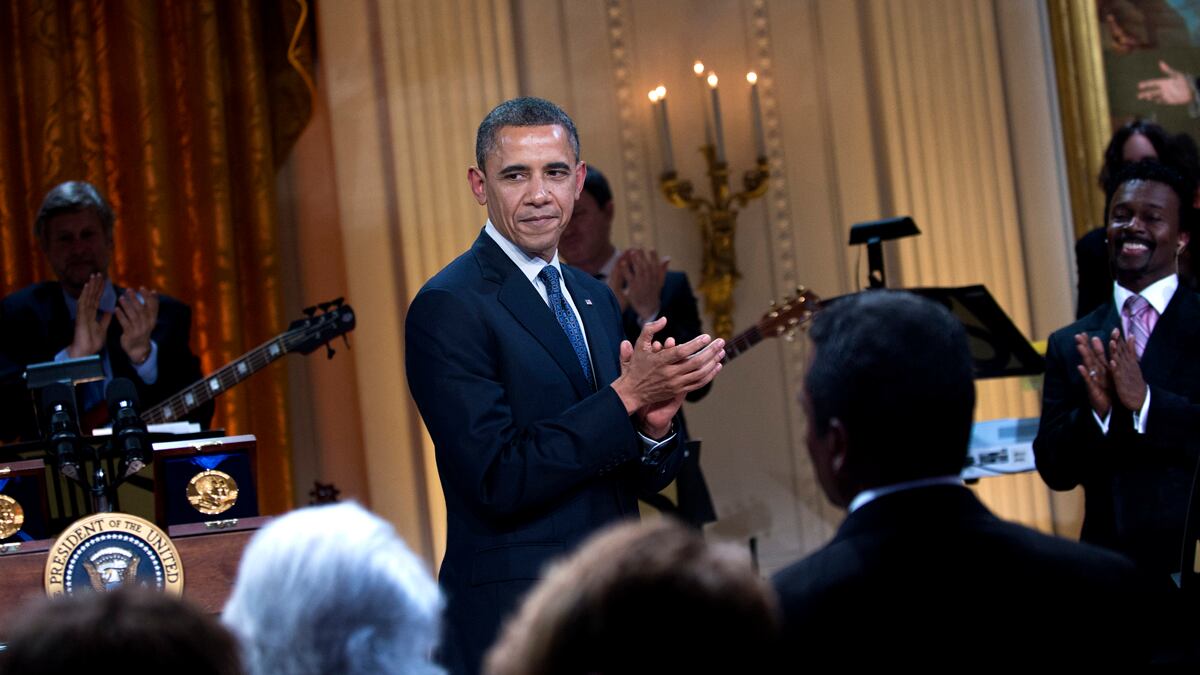The ways in which Barack Obama’s historic same-sex marriage announcement might be bad politics are obvious, and I’ve discussed them. This could bring right-wing religious voters out to the polls in numbers far greater than Mitt Romney could ever have had reason to expect. But since the announcement, I’ve been trying to think about how it might be good politics. The obvious things—energizing the youth vote and the liberal- donor base—are true enough. But there may be more. Obama and Romney will now inevitably have a running and fundamental debate that won’t be about just gay marriage, but will be about fairness and justice and which American history we’re building on as we go forward. That’s a debate that Obama—with some help from Romney—can win.

Let’s examine Romney’s reaction on Wednesday. He met the press a couple of times, first in Colorado, and then in Oklahoma. In Colorado he said that of course he was against same-sex marriage, but threw in that he also opposed civil unions: “If a civil union is identical to marriage other than in the name, I don’t support that.” He said he supported things like hospital-visitation rights and “benefits that might accrue to state workers”—presumably, putting partners on health plans and so forth. But if a civil union would allow couples to file taxes jointly, say, or engage in other activities that would force the law to recognize their couple-ness, he would oppose that.
Obama, of course, has supported the kinds of civil unions Romney said he’s against, and now he’s said he backs same-sex marriage on a personal level but would leave the states the power to make their own determinations. So we have one candidate who says no and no (marriage and unions), and one candidate who says yes and yes, fighting for votes in a country that thinks yes emphatically on civil unions and yes very narrowly on marriage. Put it on a grid. Obama is closer to, or indeed has, the majority position on both questions.
The single most important position here is not Obama’s, but Romney’s: specifically, his continuing opposition to civil unions. That one is mystifying to me. In many polls, something north of 60 percent of Americans back civil unions. George W. Bush backed civil unions in 2004. It’s yesterday’s news. Outside of right-wing circles, it’s not controversial. Yet Romney happily slid his leg into this manacle, slammed down the padlock, and threw the key into the river. He’s stuck with this one.
He’s stuck with another one, too. He signed a pledge promising that he would pursue a constitutional amendment banning same-sex marriage nationally. Now it may be that he “doesn’t really believe that.” That doesn’t matter. He signed it. He’s stuck with that one, too.
So this is what Obama needs to do: When the subject turns to this issue, he needs to make sure that Americans know that Romney opposes even civil unions, and that he would seek to outlaw gay marriage across the country, and he needs to make Romney defend those positions. Obama, in contrast, can say: “Hey, look, I took a personal position. I’m not trying to make Alabama or Oklahoma do anything they don’t want to do. But you, sir, would take already-won rights away from gay couples whose unions are now recognized in a number of states.” And then he drops this bomb: “My position is no different from Dick Cheney’s. Is he outside the mainstream?” And then, after that, he can say something like: “Governor, your own father bravely broke from his party on a great civil-rights matter. Why can’t you?”
It’s a simple rule of politics: When you’ve done something controversial, don’t play defense with it, play offense. If Obama does that, he can expose the extremism of Romney’s positions. He’ll give substance to the “forward” idea. He’ll look like, and will in fact be, a politician who has taken a gutsy stand. He’ll be able to say, entirely justifiably, that he is operating in the country’s best traditions. Romney is acting in accord with our worst ones. And if Romney changes his stance on civil unions, then he’s a flip-flopper, again, and looks incredibly weak next to the guy who took an actual stand.
So that’s the best case. It may or may not work. We’ll have to see how many millions of dollars will be poured into energizing anti-Obama voters who might otherwise have stayed at home. There are a lot of those votes to be had, and they aren’t just down South. They’re in Ohio, and Michigan, and most swing states.
But tolerant people live in those states too. In any case, even though I confess I was advising against it, I find it quite pleasing to see a Democrat stake out a chancy position and quit being mealy-mouthed out of fear of what bad things might happen to him. Obama undoubtedly has that fear, but he acted on faith that good things might happen. He is much to be admired for this. Now, having secured the beachhead, he has to hold it and even advance.






